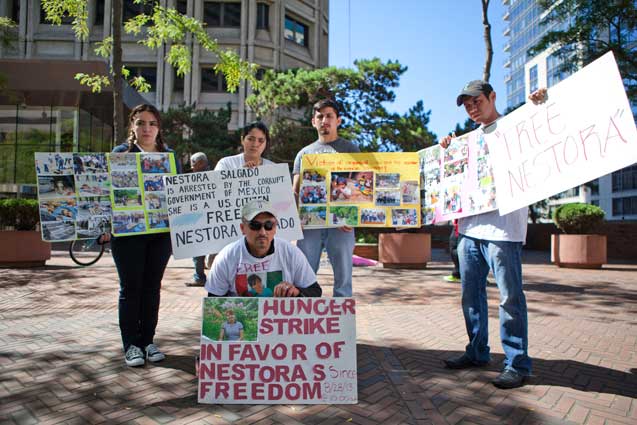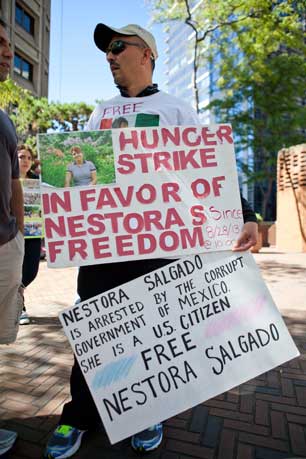
“Every time there is someone who raises their voice against corruption, they either end up dead or in jail,” Grisel Rodriguez says. We are sitting in a café in Seattle, and she is telling me about her mother, Nestora Salgado, a US citizen imprisoned in Mexico. Salgado is a coordinator of the community police in Olinala, a town in the Mexican state of Guerrero. She was arrested on August 21, 2013, and according to news releases from the Guerrero state government, she is charged with aggravated kidnapping.
However, according to Rodriguez, these charges are false. She says Salgado’s arrest is retaliation for her public denouncements of local and state officials who are taking money from organized crime. The arrest came after Salgado’s refusal to free a local official, Armando Patron, who was arrested by the community police after he was caught tampering with evidence of a double homicide and stealing property from the victims. In the days before her arrest, Salgado received death threats and was harassed at her home by the military. The governor of Guerrero, Angel Aguirre, initially supported the community police, but that changed after Salgado challenged corruption. “That’s when she became so dangerous to them – she was showing all of Mexico how corrupt these people were,” Rodriguez said. “At this point, she’s a political prisoner.”
 Ruby, Grisel’s sister, holds a collage of photos showing the violence in Guerrero. (Photo: Alex Garland Photography)Salgado is a longtime activist for women’s and indigenous people’s rights, and she goes back to Mexico multiple times a year. She resides in Washington state, but Olinala is her hometown. Until October 27, 2012, it was also the site of rampant violence, under the rule of criminal groups. “It came to a point where you would see people walk down the streets with AK-47s,” Rodriguez said. October 27 was the last straw. When a taxi driver was kidnapped and killed, the residents of Olinala went to confront the criminal group, who, according to Rodriguez, fled the town. For the next week, residents maintained checkpoints around the town, until the state government promised them more protection. At the same time, the community police was established, under the umbrella of the Regional Coordinator of Communal Authorities, or CRAC. “Crime stopped completely. No more kidnappings, no more killings, no more extortions,” Rodriguez said.
Ruby, Grisel’s sister, holds a collage of photos showing the violence in Guerrero. (Photo: Alex Garland Photography)Salgado is a longtime activist for women’s and indigenous people’s rights, and she goes back to Mexico multiple times a year. She resides in Washington state, but Olinala is her hometown. Until October 27, 2012, it was also the site of rampant violence, under the rule of criminal groups. “It came to a point where you would see people walk down the streets with AK-47s,” Rodriguez said. October 27 was the last straw. When a taxi driver was kidnapped and killed, the residents of Olinala went to confront the criminal group, who, according to Rodriguez, fled the town. For the next week, residents maintained checkpoints around the town, until the state government promised them more protection. At the same time, the community police was established, under the umbrella of the Regional Coordinator of Communal Authorities, or CRAC. “Crime stopped completely. No more kidnappings, no more killings, no more extortions,” Rodriguez said.
Such a marked decrease in crime is rare for Guerrero, where violence is the norm. In an article for Upside Down World, Clayton Conn writes that Guerrero “has seen a spike in drug-related violence over the last several years with cartel-linked extortions, kidnappings, rapes and murders.” In 2012, Guerrero tied with the state of Chihuahua for the highest murder rate in Mexico. The violence falls on members of the mostly indigenous population, whose lives are, as the CRAC web site says, “marked by marginalization, repression, lack of access to justice, and political and agrarian conflicts.”
Corruption is also a problem, as exemplified by the arrest of Salgado. Human rights violations enter in, as well. Rodriguez said Salgado was taken without an arrest warrant and has been denied access to her lawyers. In turn, her lawyers have not been given access to files about the case, and no evidence against Salgado has been presented. “We went a whole week not knowing where she was,” Rodriguez told Truthout. “We later found out she was in a maximum-security prison about 2,000 miles away from where she was apprehended.” That prison is the Federal Social Rehabilitation Center 4, in the state of Nayarit. Rodriguez also said there was no report made of Salgado’s arrest to the US embassy in Mexico City, contrary to the requirements of international law. The governor of Guerrero did not respond to requests for comment.
 Jose Luis Avila, Nestora’s husband, has been on hunger strike since August 28th, 2013 for her release. (Photo: Alex Garland Photography)While often described as vigilante groups in the media, both in Mexico and abroad, community police groups like the one in Olinala are legalized by Guerrero’s Law 701 and protected by Article 2 of the Mexican Constitution, both of which recognize the rights of indigenous communities to organize and maintain their cultural traditions. Article 39 of the constitution and international law also are invoked by the CRAC, which formed in 1995 and is well-established in Guerrero.
Jose Luis Avila, Nestora’s husband, has been on hunger strike since August 28th, 2013 for her release. (Photo: Alex Garland Photography)While often described as vigilante groups in the media, both in Mexico and abroad, community police groups like the one in Olinala are legalized by Guerrero’s Law 701 and protected by Article 2 of the Mexican Constitution, both of which recognize the rights of indigenous communities to organize and maintain their cultural traditions. Article 39 of the constitution and international law also are invoked by the CRAC, which formed in 1995 and is well-established in Guerrero.
The CRAC web site states that “in our communities, the most serious conflicts are always resolved within the assembly, and it is the people that determine the sanctions.” The site describes how their system of justice “aims at the reintegration of individuals in society” rather than punishment. Their restorative approach to justice differs from that of the Union of People and Organizations of Guerrero (UPOEG). The group formed in 2010 to protest high electricity rates and organize for indigenous self-determination. It quickly transitioned to a community police force but has been criticized by the CRAC for paramilitary-style tactics and for its close relationship with the state government. The CRAC, for its part, rejected a bid by the governor to assimilate into state law enforcement and continues to assert its right to operate independently. Recently, during protests for Salgado’s release, community members in Olinala and other towns blocked roads and took over government buildings. Despite his previous support, the governor denounced the groups in those towns as operating outside the law.
In the United States, Salgado’s family members are doing all they can to raise awareness about her case and advocate for her release. Rodriguez said they have spoken with Washington state senators Maria Cantwell and Patty Murray. In addition, members of the family traveled to Washington, D.C. to protest in front of the White House, and to United Nations headquarters in New York City. Salgado’s husband, Jose Avila, has been on hunger strike since August 28 to bring attention to the case. It is clear that family members are trying everything they can to bring Salgado home, and Rodriguez said she is doing her best to have faith. However, as the days drag on and Salgado languishes in prison, Rodriguez wonders: “Where do you go when it’s the government doing this? What do you do?” There are no easy answers.
48 Hours Left: All gifts to Truthout now matched!
From now until the end of the year, all donations to Truthout will be matched dollar for dollar up to $31,000! Thanks to a generous supporter, your one-time gift today will be matched immediately. As well, your monthly donation will be matched for the whole first year, doubling your impact.
We have just 48 hours left to raise $31,000 and receive the full match.
This matching gift comes at a critical time. As Trump attempts to silence dissenting voices and oppositional nonprofits, reader support is our best defense against the right-wing agenda.
Help Truthout confront Trump’s fascism in 2026, and have your donation matched now!